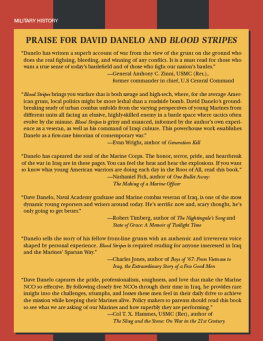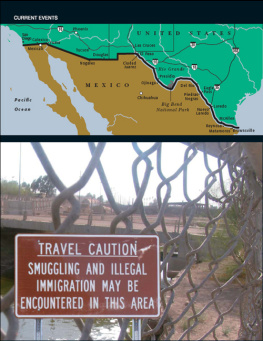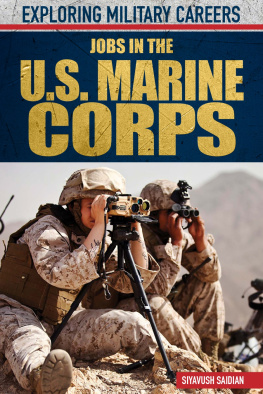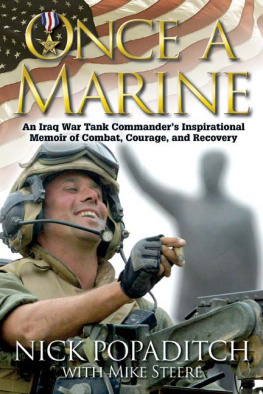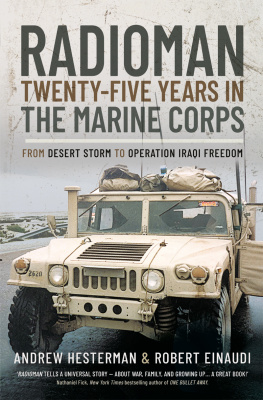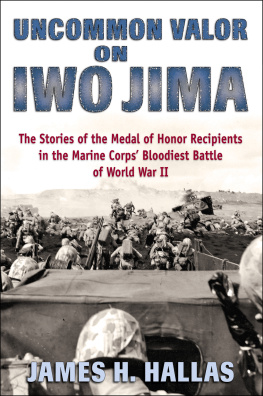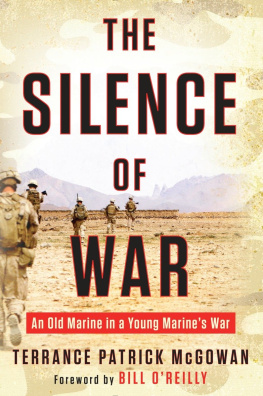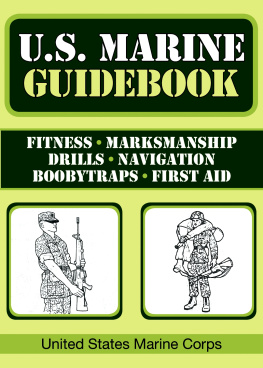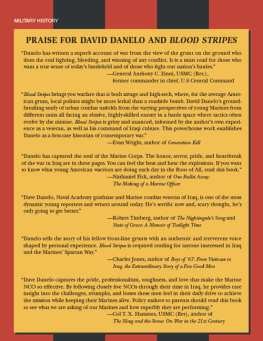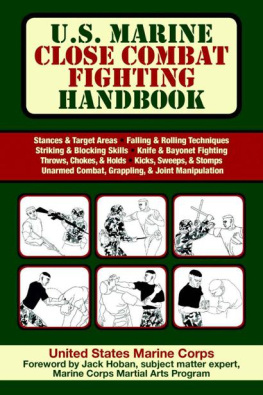BLOOD STRIPES

THE GRUNT'S
VIEW
OF THE
WAR IN IRAQ

DAVID J. DANELO
Foreword by Steven Pressfield
STACKPOLE
BOOKS
Copyright 2006 by David J. Danelo
Published by
STACKPOLE BOOKS
5067 Ritter Road
Mechanicsburg, PA 17055
www.stackpolebooks.com
All rights reserved, including the right to reproduce this book or portions thereof in any form or by any means, electronic or mechanical, including photocopying, recording, or by any information storage and retrieval system, without permission in writing from the publisher. All inquiries should be addressed to Stackpole Books, 5067 Ritter Road, Mechanicsburg, Pennsylvania 17055.
Printed in the United States of America
10 9 8 7 6 5 4 3 2 1
FIRST EDITION
Library of Congress Cataloging-in-Publication Data
Danelo, David J.
Blood stripes : the grunt's view of the war in iraq / David J. Danelo; foreword by Steven Pressfield.
p. cm.
Includes index.
ISBN-13: 978-0-8117-0164-8
ISBN-10: 0-8117-0164-6
1. Iraq War, 2003Personal narratives, American. 2. Danelo, David J. 3. United States. Marine CorpsBiography. I. Pressfield, Steven. II. Title.
DS79.76.D354 2006
956.7044'342092dc22
2005036247
eBook ISBN: 978-0-8117-4205-4
For those who fought the Muj in Iraq, and for all who follow the Spartan Way
Honor to those who in the life they lead
Define and guard a Thermopylae
Never betraying what is right,
Consistent and just in all they do
But also showing pity and compassion;
Generous when they're rich
And when they're poor,
Still generous in small ways;
Always speaking the truth
Yet without hating those who lie.
Konstantinus Kafavis,
Greek poet (18631933)
Foreword
T his book is about enlisted Marines, specifically infantrymen ranked corporal or above. Its author, David J. Danelo, is a Naval Academy graduate who served as a Marine captain in Fallujah and Al Anbar Province from February to September 2004. He tells us in these pages of the sergeants and corporals he knew and served with, what they were up against, how they respondedand what it means, or should mean, to us as citizens who will give or withhold our consent to our country's military enterprises in the coming decades of a post-9/11 world.
Wars of the twenty-first century will not be won from the top down. Success, if it comes, will be produced by the street-level troops, the men and women who are engaged day-to-day in the life of the community and with its citizens on a face-to-face basis. Victory will come, if it does, from soldiers and Marines acting in their capacity as individuals and human beings as much as in their roles as warriors or occupiers.
This is Captain Danelo's subject. His heroes are regular American guys from Iowa and New Hampshire, Kentucky and South Dakota. Not captains and generals, but NCOs. Non-Commissioned Officers. The blood stripes of the title refer to the two-inch-wide scarlet strips that run from cuff to waist on the outseam of Marine Corps dress-blue trousers. Only corporals, sergeants, and up may wear these.
NCOs are the heart and soul of the Marine Corps and always have been. How could it be otherwise in any outfit fighting on the ground? The man who makes the life-and-death decision has to be the man right there in the dirt, on the spot. A popular and, I think, very interesting concept these days is that of Fourth Generation Warfare, meaning counter-guerrilla, counter-insurgency, low-intensity conflictthe kind where a tactical victory like wasting a neighborhood and killing a few dozen bad guys can turn out to be a moral defeat, producing alienation of the populace, boosting recruiting for the enemy, destroying the village in order to save it. One of the concepts of Fourth Generation Warfare is the strategic corporalthat is, the twenty-year-old E-4 in Najaf who sees a Shiite funeral coming down the street and decides in the moment (this is a real incident, by the way) to pull his patrol off to the side and have them lower the muzzles of their rifles and remove their helmets as a gesture of respect. And who, by this act, makes friends instead of enemies and turns a potentially incendiary situation into an opportunity for progress and engagement. In other words, an NCO making a decision that captains normally make. And of course making such decisions a hundred times a day.
But when has it ever been different? When have corporals and sergeants been less important? In Al Anbar Province today, the smart move may be to defuse a potential crisis, to dial down the level of aggressiveness; on Guadalcanal, it may have been to cut loose with every ounce of firepower you've got. Either way, it's the squad leaders and platoon sergeants who most of the time make the call. In peacetime they hold the Marine Corps together; they train its recruits; they provide the role models for the next generation. In wartimewell, we know what they do in wartime.
All this is to take nothing away from Marine officers, at the company level or on up the food chain. I've gotten to know quite a few over the last couple of years, and I can testify that they are, without exception, outstanding individuals who would be just as successful in business or civilian life if they had elected to follow such a course but who, for reasons of service, honor, and maybe a little adventure, have taken up the profession of arms instead. And that's what they are: professionals. Not just hard-core physical specimens who can hold their own with the gnarliest of the grunts beneath them, but thoughtful, well-read, multidimensional leaders who are dedicated to their trade eighteen hours a day and who hold themselves to a standard of fidelity equal to that of the Greatest Generation or of any generation to wear the Eagle, Globe and Anchor.
David Danelo is one of those officers. An Annapolis grad who chose the Marine Corps, Captain Danelo served in Iraq alongside the NCOs he so expertly and empathetically depicts in these pages. As a rule, NCOs don't write books. (A few do, like Anthony Swofford, but not many.) Our corporals and sergeants need someone to speak for them, to represent their side in the public forum and to the councils of power. Captain Danelo is that man. He's the ideal guy to step up for squad leaders and platoon sergeants because he's one of them himself. An NCO at heart. You can take it from me, an old E-3 grunt myself, that Dave Danelo is one of us. And that's the highest praise an enlisted Marine can bestow.
Steven Pressfield
Los Angeles, 2006
Author's Note
S ince Iraq is an Arabic word, the English equivalent has no proper pronunciation; the closest would be eee-rock. The word derives from the Arabic uruq, which means root. Iraq, a modification requiring the addition of a single letter in the Arabic alphabet, literally translates as Root of All. To aid the reader in deciphering the nuances in both Iraqi and U.S Marine Corps culture, a glossary of terms has been appended.
Paying special attention to the corporal and sergeant point of view, Blood Stripes highlights selected characters and events that took place in western Iraq from February-September 2004. Marines referred to this foray into the Root of All as OIF II-A. This story expresses the grunt's view of the Marine Corps, the infantry, and OIF II-A, specifically the regions of Fallujah, Ramadi, and the Syrian border.

